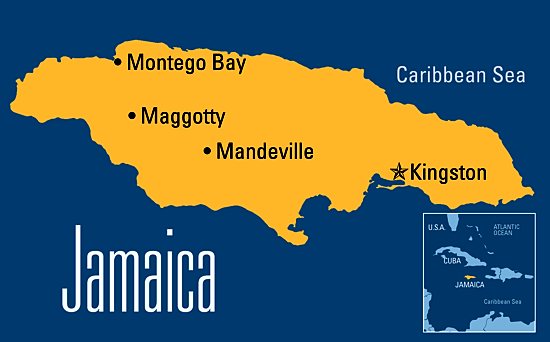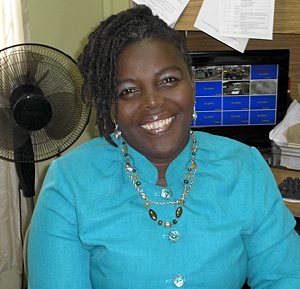
Caring for the human needs of the people of rural Jamaica and sharing the Catholic faith with them calls for a heightened sensitivity to the history and culture of the Caribbean’s second-largest island — and second poorest nation.
It’s why Hope Wood-Salmon doesn’t judge people but works with them as they are, using what her bishop described as “her very caring heart” when she visits homes to assess people’s needs.
It’s also why Bishop Neil Tiedemann of the Diocese of Mandeville in the south-central region of Jamaica said, “In everything we do we try to be the hands of Christ touching people.”
Wood-Salmon, who manages the Bishop Boyle Outreach and Resource Center of the diocese, is a native Jamaican who spoke of her culture as “our way of life, the soul of the nation, the story of our struggles and achievements.”
It’s a culture captured in the food, folklore, language, music, dance, art and craft, “and in the resilience and spirit of the Jamaican people,” Wood-Salmon told The Catholic Spirit.
 The Catholic Spirit asked Mandeville, Jamaica, diocesan minister Hope Wood-Salmon, “If you could tell Minnesota Catholics about the Catholic Church in Jamaica in just a few sentences, what would you tell them?” Her answer:
The Catholic Spirit asked Mandeville, Jamaica, diocesan minister Hope Wood-Salmon, “If you could tell Minnesota Catholics about the Catholic Church in Jamaica in just a few sentences, what would you tell them?” Her answer:
“The Bible exhorts us to be the hands and feet of Christ. As Jamaican Catholics and few in numbers (2 percent), the call to service is as relevant as any other time. We are undaunted by our numbers as the focus is on making the Gospel of Jesus Christ come alive and to impact and transform lives, particularly of the poor and dispossessed. The vibrancy of our worship is reflected in our gratitude to God for his faithfullness and providence to us as a nation. We coexist peaceably and show respect for each other’s individuality and right to existence. We are the Church and service is our hallmark. In the words of our former bishop, Bishop Gordon Bennett, “We do what we do, not because they are Catholics, but because we are Catholics.”
Historical and cultural struggles, however, are still with many Jamaicans, remnants of conquering and slavery by the Spanish and then the British, she said.
Christopher Columbus destroyed the culture and civilization he found on the island in the 15th century, imposing the Spanish way of life and bringing diseases that decimated the native population at the time, she said.
Slaves brought to Jamaica to work the sugar cane fields had to be obedient to their colonial masters. “The ravages are still part of us,” Wood-Salmon said.
“Even though people are not aware of their chains and shackles, over time what has been left is that persons feel they are not good enough,” she said.
Some Jamaicans bleach their skin, she said, because they think their complexion is too dark and they have to have a lighter complexion to get ahead.
“It’s a mental slavery,” Wood-Salmon said.
To counter the slave mentality, ministries in the Diocese of Mandeville take the approach that all are equal irrespective of ethnicity, color or creed, Wood-Salmon explained.
Diocesan programs focus on empowerment and raising the standards of living, she said.
She pointed to funding for microbusinesses to enable people to become self-sufficient and support their families; to education assistance for students to assist with tuition, busing, books and lunches; and to shelters for the poor, health clinics, a home for the aged and a home for disabled children, among others.
The diocese is able to offer these services thanks to prayer and financial support from the United States through donations on World Mission Sunday, Bishop Tiedemann said, and does so while respecting people and their dignity.
“We have financial and physical challenges,” the bishop said, “but we strive to make sure that all we do we do as brothers and sisters, sharing God’s love.”
For example, at the four clinics the diocese operates, “It’s really Jesus reaching out to the people,” he said. “We want to walk with and be with the people.”
To respect the local culture and the dignity of the Jamaican people, sharing life and faith is what is asked of those who come to volunteer in or visit the Mandeville diocese, explained Bishop Tiedemann, a Passionist missioner who hails from Brooklyn, New York.
Just as a group of 12 from the Archdiocese of St. Paul and Minneapolis will be visiting at the end of January under the auspices of the Pontifical Mission Societies, individuals, parish and diocesan groups who come to help get an orientation when they arrive, the bishop said.
“We encourage them to see what they are doing as a collaboration with local people, working together with them and with mutual respect,” Bishop Tiedemann said. “And we want them to think, ‘What gift do I receive from my visit to Jamaica?’”



